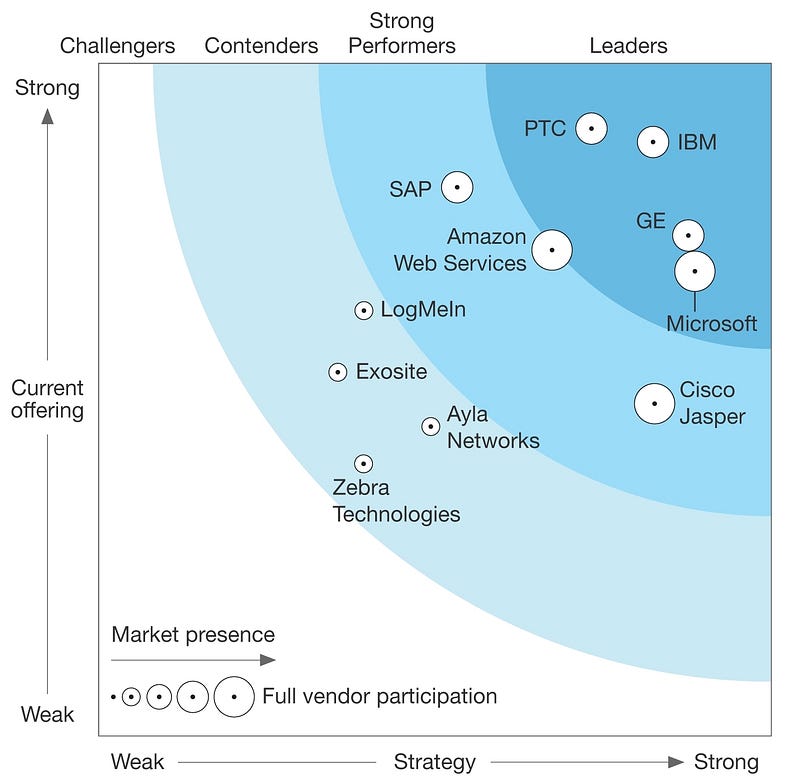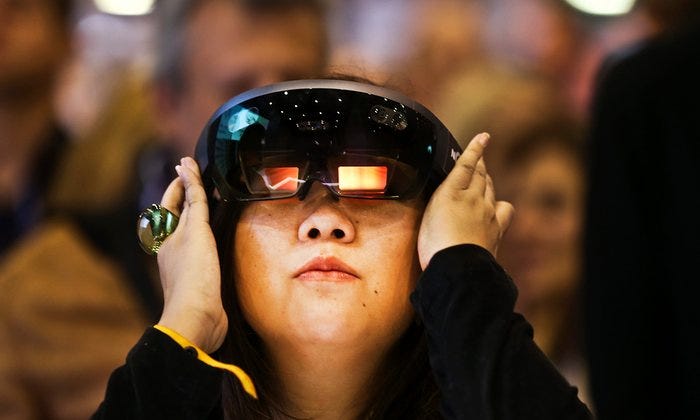IoT Platform Q4 2016 Roundup, VR Powered by Our Minds, and Big Data in Social Sciences
IoT Platform Q4 2016 Roundup, VR Powered by Our Minds, and Big Data in Social Sciences
- Last Updated: December 2, 2024
Yitaek Hwang
- Last Updated: December 2, 2024



IoT Platform Q4 Roundup
One of the most pronounced problems in IoT is the issue of fragmentation. A complete IoT solution requires the seamless integration of hardware, network protocols, software, analytics, and user interface. In a market riddled with a lack of industry standards, IoT platforms aim to simplify the development process and mitigate the obstacles in deploying IoT solutions. This week, Forrester Wave released their report on 11 major IoT platform providers. As more and more businesses turn to IoT solutions, understanding how the market is shaped will grow increasingly important.

Summary:
- Forrester concluded that IBM, PTC, GE, and Microsoft currently lead the IoT platform market. It is surprisingly to see AWS considered a competitor on the outside looking in. Amongst minor players, Exosite, Ayla Networks, and Zebra Technologies made the list as potential competitors.
- With over 60% of global enterprises leading towards using IoT solutions, the need for effective IoT platforms will continue to grow to build connected products, leverage big data analytics, and improve operational efficiency.
- Successful IoT platform companies currently provide easy to use prebuilt applications, analytic functions driven by machine learning and big data, and a multitude of solutions from data ingestion to visualization. Forrester expects those that allow extended functionality through partner ecosystem to lead the market in the future.
Takeaway: The IoT platform landscape is constantly changing. After Forrester evaluated the 11 platforms, there have been major changes: Microsoft released virtual device functionality in IoT hub and updated its cognitive toolkit. AWS also made major improvements to its user interface earlier this month. As more businesses are discovering the value in IoT is in the services not just in the devices, the ecosystem that successful platforms provide will become a crucial piece of your IoT solution.
VR Powered by our Minds
Virtual reality is still a thing of the future for many. Many of its applications are limited to gaming, and VR headsets are either prohibitively expensive or not powerful enough to make VR truly useful. Dan Cook, CEO of EyeMynd, believes that the future may be closer than we think. He envisions an operating system that translates brainwaves into the VR world without invasive electrodes, handsets, or controllers. Cook’s vision echoes what Facebook CEO Mark Zuckerberg publicly announced earlier this year about the possibility of brain-to-brain communication — or in more layman’s terms, telepathy.

Summary:
- EyeMynd plans to launch a headpiece that monitors brainwaves in spring 2017. The brainwaves picked up by 16 electroencephalography (EEG) sensors will be translated by EyeMynd’s Brainwave OS and will be compatible with the HTC Vive.
- The first version will ship with a game called “Smile with Lucy,” to calibrate brainwaves signal. Currently the calibration process takes an hour, but Cook hopes to cut that down to three minutes with improved processing power.
Takeaway: Cook is envisioning a future where VR accessories will become obsolete as brain sensors take over the role of motion sensors, headsets, and cameras. Brain-directed VR certainly has a lot of potential in scientific communities providing virtual therapy (see LWITF v7.0) to advertising space tracking response to ads. We will see if Cook’s vision is merely a fantasy or a step towards reality next spring.
Quote of the Week
“It’s unlikely that big data will bring about a fundamental change to the study of people and society…In other words, the systematic recording of masses of data alone won’t be enough to ensure the reproducibility and objectivity of social studies, because these studies need to use often controversial social concepts to make their data significant. They use them to organize “raw” data into objects, categories and events, and in doing so they infect even the most “reliable event data” with their partiality and subjectivity.”
- Simon Chandler, TechCrunch Staff
The success of big data cannot be overstated in hard sciences. However, Simon Chandler argues that big data’s role in the social, political, and economic realms are much more limited. While some social science scholars argue that data analytics may lead to improved objectivity and clarity, big data alone cannot alter the inherent subjective nature of the concepts in social sciences. Chandler takes the idea of “war” or “adult” for example to illustrate how these social constructs take on new meaning based on the communities who propagate them.
More concretely, Chandler cites a recent study published in the Sept 30 issue of Science. The study attempted to monitor global societal events using big data provided by Lockheed Martin’s International Crisis Early Warning System (ICEWS), Georgetown University’s Global Data on Events Language and Tone (GDELT), the University of Illinois’ Social, Political, and Economic Event Database (SPEED) and the Gold Standard Report (GSR) maintained by the not-for-profit MITRE Corporation.
To test the reliability of these systems, the authors tested if these datasets could register similar protests in Latin America. They found that only 10.3% of the protests showed significant similarities with the combination of the four databases despite their sheer volume. Also, the study found that 79% of GDELT’s recorded protests never occurred, and ICEWS had duplicate events.
While significant improvements in cleaning up the data could theoretically improve the results, Chandler points to a flawed underlying assumption in relying heavily on big data in social science. The data is inherently subjective, and no amount of hyper-tuning parameters on these analytic algorithms could yield impartial results.
Looking at how data failed us in the elections and adding to it Chandler’s view, we can start to see that perhaps big data isn’t the cure-all for everything.
The Rundown
- Explore machine learning by playing with these experiments — A.I. Experiments
- Introduction to Deep Learning — Algorithmia
- Brighten Your Day with Neural Networks — SC5.io
- Python Web Scraping with BeautifulSoup — Dataquest.io
- Data Science Deployment with Docker — Indico.io
Resources
- Google Earth VR: Explore the world with VR
- Commits.io: Make a poster out of your code
- PhotoScan: Google’s photo scanning solution
- ExploringJS: List of free JS books by Dr. Axel Rauschmayer
- ThingMonk 2016: Talk by Stacey Higginbotham
The Most Comprehensive IoT Newsletter for Enterprises
Showcasing the highest-quality content, resources, news, and insights from the world of the Internet of Things. Subscribe to remain informed and up-to-date.
New Podcast Episode

What is Hybrid Connectivity for IoT?
Related Articles



